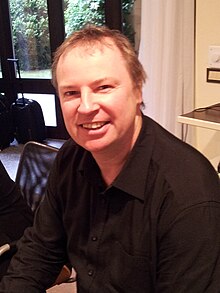Peer Bork
Appearance
Peer Bork | |
|---|---|
 | |
| Nationality | German |
| Scientific career | |
| Fields | Computational biology |
| Institutions | European Molecular Biology Laboratory |
| Website | embl |
Peer Bork is a German bioinformatician.[1] He is head of structural and computational biology at the European Molecular Biology Laboratory in Heidelberg, in south-west Germany.[2]
Bork received his PhD in biochemistry in 1990 and his habilitation in theoretical biophysics in 1995.[citation needed] He has worked on the microbiomes of humans and other animals.[1]
He is on the board of editorial reviewers of Science,[3] and is a senior editor of the journal Molecular Systems Biology.[4]
In 2008 Bork received the Nature "mid-career achievement" award for science mentoring in Germany.[5] He received an honorary doctorate from the University of Utrecht in 2017.[6]
References
- ^ a b Alison Abbott (8 January 2016). Scientists Bust Myth That Our Bodies Have More Bacteria Than Human Cells. Nature doi:10.1038/nature.2016.19136.
- ^ Tanya Lewis (28 April 2016). Transplanted Fecal Microbes Stick Around. The Scientist. Accessed December 2017.
- ^ Editors and Editorial Boards. American Association for the Advancement of Science. Accessed December 2017.
- ^ Editors & Board. EMBO. Accessed December 2017.
- ^ Nature Awards for Mentoring in Science – Germany (2008). Springer Nature. Archived 15 July 2017.
- ^ Honory [sic] Doctorate for bioinformatician Peer Bork. Utrecht Bioinformatics Center. Accessed December 2017.
